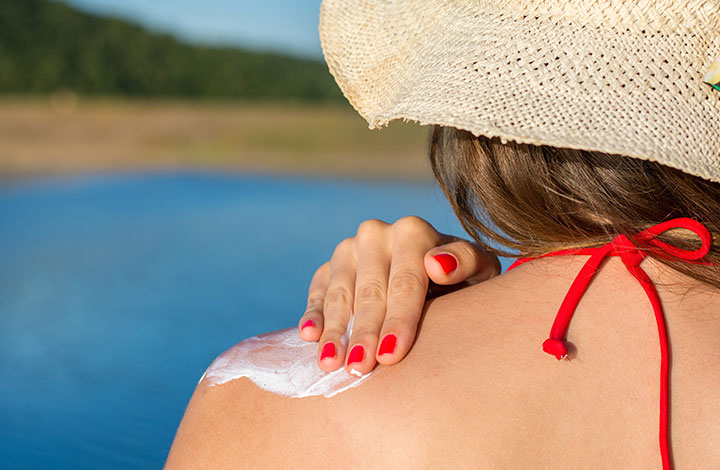Blog

As summer approaches you’re likely to spend more time out of doors enjoying the nice weather that has finally arrived after a harsh and prolonged winter.
This time of year, the sun is stronger and that means you have to take more care to protect your skin, says Dr. Alan Westheim, dermatologist at St. Luke’s Medical Associates of Monroe County in East Stroudsburg. “The first thing I always tell my patients is to wear sunblock and to cover up as much as you can from the sun. Excessive exposure will lead to skin aging and skin cancers.”
If you are planning outdoor activities, try and schedule them before 11 a.m. or after 3 p.m. That’s because the sun is the strongest between those hours, Dr. Westheim explains.
Dr. Westheim recommends sunblock with an SPF of 30 or more for the best protection. Sunblock with an SPF of 30 blocks 97 percent of the sun’s harmful rays. You also want to look for the words “broad spectrum” or “full spectrum” on the sunblock. There are two types of ultraviolet light that are harmful to your skin – UVA and UVB. Broad spectrum or full spectrum sunscreens protect you skin from both types.
Be sure to reapply your sunscreen if you’re outside for more than two or three hours or if you’ve gone swimming or are sweating profusely, Dr. Westheim says.
Another option is to wear clothing that has built-in sun protection, Dr. Westheim says. The sun can penetrate most ordinary clothing. Bathing suits and active wear that has built-in sun protection has become increasingly popular and is “a good thing,” he says. “It will add protection.”
Some medications including acne treatments, antibiotics, allergy medications, antidepressants and some vitamins and herbs can make people more sensitive to the sun. “Reactions could be burns and pigmentation,” Dr. Westheim says. Talk to your doctor if your medication makes you more sun sensitive, Dr. Westheim says, and be sure to cover up when you’re outdoors.
More skin care tips for spring
Additional skin tips for spring from Dr. Westheim:
Do a skin check. “A lot of people see more of their skin this time of year because they put on bathing suits, shorts and sleeveless tops,” Dr. Westheims says. “Take the time to look at your skin from head to toe and make sure there are no changes in moles or growths that have appeared.”
Stay hydrated. For overall health it is important to stay hydrated especially for older people in the heat to avoid problems such as heat exhaustion and heat stroke. If you exercise and are sweating profusely, be sure you replenish your body with lots of water. Swimming may dry out your skin, especially if you’re in the pool or lake for a prolonged time. You can apply moisturizer when you get out to limit the irritation of your skin.
Cover up. If you’re headed for the woods for a hike or an adventure, be sure to cover up. Wear long pants and long sleeves to protect yourself from deer ticks that can carry Lyme disease. “The only proven protection can be obtained with repellants containing DEET,” Dr. Westheim says.
Avoid scents. Don’t wear perfumes or scented sun blocks as they can attract more bugs that can bite and cause skin irritations. “Some scents keep bugs away and some attract bugs,” Dr. Westheim says.
Know your plants. You can get poison ivy from the oils in the plant. If you see poison ivy, stay away. “A popular saying is leaves of three let them be.” If you touch it, wash your hands immediately.





